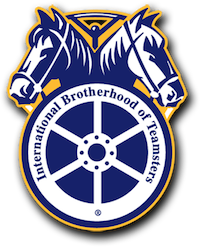Alliance for Downtown Raises Wages for Teamster Cleaners
The Alliance for Downtown New York today announced that all of the organization’s employees will receive a base wage of at least $15 an hour. As the city’s largest business improvement district, this policy change will impact a total of approximately 80 workers. George Miranda, President of Teamsters Joint Council 16; Michael Smith, President of Teamsters Local 810; and Denis Johnston, 32 BJ SEIU Vice President and Director of Security Division, joined Jessica Lappin, President of the Downtown Alliance, along with dozens of the organization’s uniformed public safety, sanitation and tourism service staff members. The announcement was made at the organization’s Lower Manhattan central operations facility.
The wage increase will be phased in over the next two and a half years, to be completed by end of 2018, and will impact both unionized and non-unionized employees. The schedule for phasing in the changes is in line with Governor Cuomo’s commitment to increase wages for fast food and State workers and with Mayor de Blasio’s commitment to increase wages for municipal workers. By end of year this year, all hourly wages will be raised to $12. At the end of 2017, they will increase to $13.50 and by the end of 2018, to $15.00.
“I’m incredibly proud that the Alliance is making the decision to increase the minimum wage to $15 an hour for all of our uniformed service employees,” said Downtown Alliance President Jessica Lappin. “These men and women dedicate themselves each and every day in service to Lower Manhattan. Today, we make sure their wages reflect the significance of their work and can better support themselves and their families.” Lappin added, “I want to note that the Alliance is in a unique position and doesn’t face many of the same challenges our colleagues in smaller BIDS face. However, we are able to take this step and are confident it is the right thing to do.”
“A $15 minimum wage will help lift families out of poverty and restore the promise of dignity and respect for hardworking New Yorkers,” said Governor Andrew M. Cuomo. “I commend the Alliance for Downtown NY for leading by example – and I urge all state lawmakers to follow their lead. It’s time for New York to pass a $15 minimum wage and lead the nation in the fight for fair pay.”
“Nothing does more to lift up working families, and our economy, than boosting wages,” said Mayor Bill de Blasio. “That’s why the City is guaranteeing a $15 minimum wage for all our employees. Now, the Downtown Alliance is setting an example that we hope employers across the city will follow – and that will continue to build momentum toward the State and federal action we need.”
George Miranda, Teamsters Joint Council 16 President, said, “Jessica Lappin and the Alliance for Downtown New York are showing that responsible employers will not wait for Albany to force them to raise wages. Teamsters Local 810 members at the Downtown Alliance have played a vital role in growing Downtown and they deserve a living wage. This is the kind of leadership we need, alongside advocacy from Governor Cuomo and Mayor de Blasio, as the $15 minimum wage moves forward in Albany.”
“The Fight for $15 has won public support in our city, our state and our country and working people are standing up and saying no one who works full time should live in poverty,” said 32BJ President Hector Figueroa. “The Downtown Alliance is taking the lead as an employer fighting against poverty wages. This will have a big impact on nearly 80 workers, many of whom are security officers and members of our union, who will now be able to better support themselves and their families. We encourage other Business Improvement Districts to follow their example.”
“This change will have a great impact on hard working people who commit themselves in service to Lower Manhattan, as well as to the families they support. We hope businesses citywide will follow the Alliance’s lead as we continue our fight for fair wages,” said City Comptroller Scott Stringer.
In its first year, the change will impact 50 percent of the Alliance’s sanitation workforce. In years two and three of the phase in, it will impact 75 percent of its sanitation and 25 percent of its public safety workforce.
